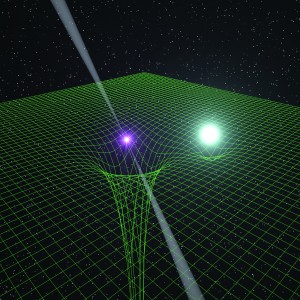TORONTO [15 November 2016] John Antoniadis, a Dunlap Fellow at the Dunlap Institute for Astronomy & Astrophysics, University of Toronto, has been awarded a prestigious Polanyi Prize in Physics for his research into neutron stars and other compact astronomical objects.
“I am humbled to receive this honour,” says Antoniadis. “I sincerely hope that my contributions to the understanding of neutron stars reflects the outstanding work carried out across Canada—in Toronto, Vancouver, Montreal, Edmonton and elsewhere.”
The Polanyi Prizes were established in 1987 by the Council of Ontario Universities to honour the achievement of John Charles Polanyi, who received the 1986 Nobel Prize in Chemistry. They are awarded annually to outstanding researchers in the early stages of their career and pursuing post-doctoral research at an Ontario university. Antoniadis is one of five receiving their prize today who represent the province’s next generation of innovators.
“The Polanyi Prize recognizes research which would have been impossible without the continuing support of the Dunlap Institute and the University of Toronto,” says Antoniadis, “and I consider myself lucky to be part of the institute and the Canadian pulsar community.”
Antoniadis uses pulsars—rapidly rotating neutron stars that emit a beam of radiation—as laboratories to test some of the most fundamental questions in modern physics. He is also advancing research into the measurement of the masses of millisecond pulsars; i.e. pulsars with rotational periods measured in thousandths of a second.

Rendering of a binary comprising a pulsar (l.) and a white dwarf star (r.). Image: Dr. John Antoniadis
In work prior to the February 2016 announcement of the first direct detection of gravitational waves, Antoniadis and collaborators used observations of binary pulsars to demonstrate that gravitational waves follow the predictions of Einstein’s General Relativity.
According to Dunlap director Prof. Bryan Gaensler, “John is a uniquely creative and energetic researcher who has made dramatic new progress on a fundamental problem in astronomy: how much do stars weigh? His signature achievement—determining masses of stars thousands of light-years away to multiple decimal places—is a triumph of intellect and ingenuity.
“His work is the embodiment of the innovative approach that we pursue at the Dunlap Institute,” says Gaensler, “and the Polanyi Prize is just one of the many accolades that I expect John to accumulate over his career.”
Antoniadis received his PhD from the Max Planck Institute for Radio Astronomy and has been a Dunlap Fellow since 2014.
In addition to the Polanyi Prize, Antoniadis has also received the Otto Hahn Medal of the Max-Planck Society (2014); Best PhD in Gravitational, Nuclear and Atomic Physics (2013); and Best PhD, University of Bonn (2013).
The Polanyi Prizes were created and are funded by the Ontario government and are administrated by the Council of Ontario Universities. COU is “the voice of Ontario’s universities, promoting the value of education, research and innovation that leads to social, cultural and economic success.”
Antoniadis and the other 2016 winners were presented with their awards on Tuesday, Nov. 15th, at a ceremony at Massey College, University of Toronto.
-30-
Contact details:
Dr. John Antoniadis
Dunlap Institute for Astronomy & Astrophysics
University of Toronto
p: 416-946-5432
e: antoniadis@dunlap.utoronto.ca
w: www.dunlap.utoronto.ca/dr-john-antoniadis-2
Twitter: @astrovegan
For interview inquiries on November 15th:
Tanya Blazina
Ministry of Advanced Education and Skills Development
Communications Branch
p: 416-325-2746
w: www.news.ontario.ca/tcu/en
For more on the Dunlap Institute:
Chris Sasaki
Communications Co-ordinator
Dunlap Institute for Astronomy & Astrophysics
University of Toronto
p: 416-978-6613
e: csasaki@dunlap.utoronto.ca
The Dunlap Institute for Astronomy & Astrophysics at the University of Toronto is an endowed research institute with over 40 faculty, postdocs, students and staff, dedicated to innovative technology, groundbreaking research, world-class training, and public engagement. The research themes of its faculty and Dunlap Fellows span the Universe and include: optical, infrared and radio instrumentation; Dark Energy; large-scale structure; the Cosmic Microwave Background; the interstellar medium; galaxy evolution; cosmic magnetism; and time-domain science.
The Dunlap Institute, Department of Astronomy & Astrophysics, Canadian Institute for Theoretical Astrophysics, and Centre for Planetary Sciences comprise the leading centre for astronomical research in Canada, at the leading research university in the country, the University of Toronto.
The Dunlap Institute is committed to making its science, training and public outreach activities productive and enjoyable for everyone, regardless of gender, sexual orientation, disability, physical appearance, body size, race, nationality or religion.
###

